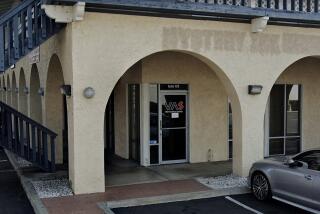Former Officers of Beverly Hills S&L; Sued by FSLIC
- Share via
Federal savings and loan regulators have sued more than a dozen former directors and officers of Beverly Hills Savings & Loan, charging that their questionable real estate transactions, negligent lending practices and “junk bond” investments caused more than $120 million in losses.
The lawsuit, filed late last week in Federal District Court in Los Angeles, names both Paul Amir and Dennis M. Fitzpatrick as defendants in the suit. They were the last two officials to serve as chief executive of the failing financial institution.
Amir, a Los Angeles area developer, declined comment, saying he hadn’t read the suit yet. Fitzpatrick couldn’t be reached.
The lawsuit, which seeks more than $300 million in damages, was filed by the Federal Savings and Loan Insurance Corp., the agency installed as receiver when the S&L; was taken over by federal regulators last year. The FSLIC also insures savings up to $100,000 per account should an institution be closed.
Though many of the reasons for Beverly Hills Savings’ failure have been disclosed previously, the FSLIC action contains new details and insights into the failure.
The suit said that Beverly Hills Savings, which is based in Mission Viejo, sustained heavy losses on its junk-bond portfolio, which grew from nothing to $300 million between March and December, 1984.
(Junk bonds are high-yielding but risky corporate debt securities that carry either a low credit rating or no rating at all.)
Beverly Hills Savings has lost more than $10 million through these investments because the company didn’t properly research them and added to the risk by investing in a “relatively small number” of securities, the suit said.
Another target of the suit is an $11-million loan made in March, 1985, to Ashkenazy Enterprises, run by Los Angeles-area hotelier Severyn Ashkenazy. Losses on the loan already exceed $5 million, the suit said, because the loan was “highly imprudent” and poorly underwritten because of appraisals that were “inadequate or non-existent.”
Ashkenazy, who was not named in the suit, said in a phone interview that “we made a proposal to repay the money, and it was rejected by FSLIC.” The suit did not state the reason for the loan, and Ashkenazy declined further comment.
Beverly Hills Savings was seized on April, 23, 1985, because the financial institution was in “an unsafe and unsound condition” due to poor quality real estate development loans, regulators said.
Earlier that day, the Amir-led management had filed suit in Los Angeles County Superior Court charging that former officers of the company, led by Fitzpatrick, had taken the S&L; on a “four-year financial joy ride.”
Amir had ousted Fitzpatrick as chief executive after a prolonged and messy fight for control in 1983 and 1984.
The “joy ride” charge was to be repeated several months later by Rep. John D. Dingell (D-Mich.), whose House Energy and Commerce oversight subcommittee probed into the collapse of Beverly Hills Savings.
Beverly Hills Savings has remained open for business under special regulatory supervision, though it remains in poor condition. The financial institution had a negative net worth of more than $500 million at year-end, company figures show.
The heaviest losses--more than $60 million, according to the suit--were sustained through an apartment acquisition program with real estate investor James D. Stout, who was not named in the lawsuit.
The program, through which 56 apartment buildings were acquired with loans of more than $140 million, was plagued by conflicts of interest and improper accounting methods that hid the true losses of the apartment loans, the suit said.
Heavy losses also occurred because of more than $60 million worth of business dealings with Werner Rey, the Swiss investor and erstwhile Fitzpatrick ally who was brought in as a “white knight” in 1983 to stave off the move by Amir to take control.
Though Rey dropped out of the fight in early 1984, the suit notes that Beverly Hills Savings has lost at least $40 million by buying properties from Rey.
Rey, who was named as a defendant, declined to comment.
More to Read
Inside the business of entertainment
The Wide Shot brings you news, analysis and insights on everything from streaming wars to production — and what it all means for the future.
You may occasionally receive promotional content from the Los Angeles Times.










